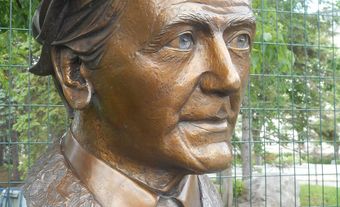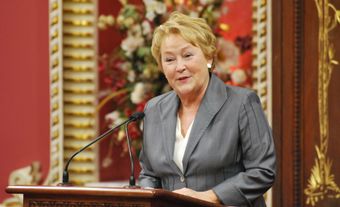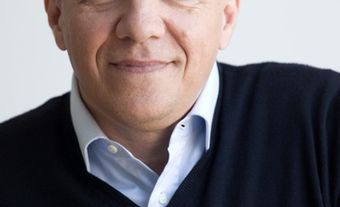Paul St-Pierre Plamondon (nickname "PSPP"), politician, lawyer, author and columnist (born 17 February 1977 in Trois-Rivières, QC). On Paul 9 October 2020, St-Pierre Plamondon became the tenth leader of the Parti Québécois. In 2022, he became a member of the National Assembly for the Camille-Laurin riding. (See also Camille Laurin.) His political activism involves popularizing nationalist issues for potential future Quebec sovereignty.

Formative Years
Paul St-Pierre Plamondon comes from an active family. His father, Jacques Plamondon, was general manager of the Fédération de tennis de table du Québec (Quebec Table Tennis Federation) for several years. As for Paul, he played tennis actively, developing his perseverance. Before competitions, he was inspired by the New York Mets’ achievement in 1969, immortalized on a vinyl record that his father distributed. Known as the “miracle team,” the Mets defied expectations after years of disappointing performances, becoming a symbol of resilience. Jacques Plamondon instilled in his son the belief that being tenacious can lead to achieving the unimaginable, telling him that dreams and perseverance sometimes work miracles, even when everything goes wrong – advice that shaped Paul St-Pierre Plamondon. Later, he said that his father taught him that we must act according to our values and the project we wish to serve, not to please others.
Paul St-Pierre Plamondon studied law. He holds an international law certificate from the University of Lund, Sweden, and a Bachelor in Civil Law and Common Law from McGill University, in Montreal. Later he completed an MBA at Oxford University in England.
Plamondon’s thirst for knowledge led him not only to pursue his studies, but also to work in various parts of the world. He used his expertise as a volunteer prosecutor for the Assembly for Human Rights in Bolivia, and worked as an intern in judicial affairs for NATO, in Belgium.
Involvement in Social Issues
Paul St-Pierre Plamondon wrote down his thoughts to fuel social debates. He wrote chronicles on BazzoTV and Les Affaires newspaper. His constant interest for trends and movements driving the world and its communities reinforced Plamondon’s conviction that Quebec would benefit from becoming a sovereign country.
In 2010, he first came to public attention when he organized the first Sommet Génération d’idées [Generating Ideas Summit]. A few years early, he cofounded the Génération d’idée think tanks with Mélanie Joly and Stéphanie Raymond-Bougie. Génération d’idée is a non-partisan project designed to interest young people aged 20 to 35 in Quebec’s public issues.
In 2014, he published an essay entitled Les Orphelins politiques : plaidoyer pour un renouveau du paysage politique québécois, while at the same time creating a political movement bearing the same name.
Political Involvement
During the 2012 Quebec Student Strike, Paul St-Pierre Plamondon was the lawyer for the Fédération des associations étudiantes du campus [Federation of Campus Student Associations] of the Université de Montréal (FAECUM). He defended the demands of Quebec students. On 14 March 2012, he co-signed an opinion piece in the newspaper Le Devoir, which pointed out that tuition fee increases perpetuate intergenerational inequity. According to those who signed, the planned increase in university fees was almost double that paid by previous groups of students. After one of its pavilions was vandalized by protesters, the Université de Montreal applied for an injunction to prohibit demonstrations on its campus. It argued that its infrastructure was private, in the same way as a shopping mall. The application was rejected by the court, and Plamondon said the following: “The university is not a Mac’s Milk. It’s a place for exchange, knowledge and debate, financed by public funds.” However, he feared that the movement was laced with revolutionary romanticism, and he aimed to calm the strikers’ anger.
In 2016, Plamondon first tried his hand in politics, aiming to become the leader of the Parti Québécois. Instead, he became the special advisor to Jean-François Lisée. In 2017, after four months of public consultation, he worked on the Osez repenser le PQ [Dare to Rethink the Parti Québécois] report. More than 3,600 people were surveyed, with a focus on anyone under 40 and those from culturally diverse and entrepreneurial backgrounds. During his tour of 162 consultations, he wanted to hear proposals for revitalizing the Parti Québécois. The report contained 156 recommendations.
In 2020, he tried again and achieved his goal of becoming the leader. As the head of the Parti Québécois, Plamondon put emphasis on modernizing the party, political innovation, and engaging younger generations. In addition, he spread his ideas far and wide. The main subjects of the many conferences he gave in Canada and elsewhere in the world were the preservation of the French language, the eventual independence of the province of Quebec and the place of Quebec culture in this era of globalization.
Plamondon’s vision for Quebec is that of a province that is strong, independent and proud of its uniqueness. He sees independence not only as a political objective, but also as a means for ensuring the prosperity and well-being of the Quebec nation.
In 2020, Plamondon published the book Rebâtir le camp du oui. The book is a compendium of his observations on the factors that will bring Quebec independence back to the forefront of public concerns.
On 13 and 14 April 2024, during the Conseil national du Parti Québécois, held in Drummondville, the party leader asserted that “within a few years, certainly by the end of the decade, we will be living through a third referendum on Quebec independence.” If the Parti Québécois is elected to power, he wants a referendum on Quebec sovereignty to be held within the first mandate. (See: Quebec Referendum (1980); Quebec Referendum (1995).)

 Share on Facebook
Share on Facebook Share on X
Share on X Share by Email
Share by Email Share on Google Classroom
Share on Google Classroom


